Eugenics - Study guides, Class notes & Summaries
Looking for the best study guides, study notes and summaries about Eugenics? On this page you'll find 415 study documents about Eugenics.
Page 4 out of 415 results
Sort by
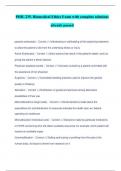
-
PHIL 235- Biomedical Ethics Exam with complete solutions already passed
- Exam (elaborations) • 34 pages • 2023
-
- $12.49
- + learn more
PHIL 235- Biomedical Ethics Exam with complete solutions already passed passive euthanasia - Correct withdrawing or withholding of life-sustaining treatment to allow the patient to die from the underlying illness or injury Active Euthanasia - Correct direct actions that result in the patient's death, such as giving the patient a lethal injection. Physician-assisted suicide - Correct Voluntary suicide by a patient committed with the assistance of her physician Eugenics - Correct Controll...
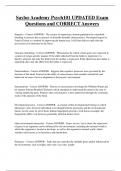
-
Saylor Academy Psych101 UPDATED Exam Questions and CORRECT Answers
- Exam (elaborations) • 13 pages • 2024
-
- $8.49
- + learn more
Saylor Academy Psych101 UPDATED Exam Questions and CORRECT Answers Eugenics - Correct ANSWER- The science of improving a human population by controlled breeding to increase the occurrence of desirable heritable characteristics. Developed largely by Francis Galton as a method of improving the human race, it fell into disfavor only after the perversion of its doctrines by the Nazis. Genomic imprinting - Correct ANSWER- Phenomenon by which certain genes are expressed in a parent-of-orig...
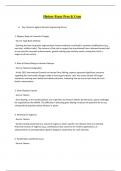
-
History Essay Pros & Cons
- Exam (elaborations) • 12 pages • 2024
-
- $9.39
- + learn more
History Essay Pros & Cons A. Key Concerns Against Genetic Engineering (Cons) 1. Slippery Slope to Cosmetic Changes - Source: Sage Buck Institute Opening the door to genetic engineering in human embryos could lead to cosmetic modifications (e.g., eye color, athletic traits). The concern is that just as surgery has transitioned from a disease-focused tool to one used for cosmetic enhancements, genetic editing may similarly evolve, raising the risk of a eugenics-driven society. 2. R...
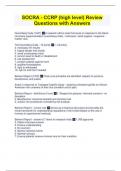
-
SOCRA - CCRP (high level) Review Questions with Answers
- Exam (elaborations) • 31 pages • 2024
-
- $14.49
- + learn more
Nuremberg Code (1947) A research ethics code that arose in response to the Nazis' inhumane experimentation (nuremberg trials) - holocaust, racial hygiene / eugenics / master race. The Nuremberg Code - 10 points 1. voluntary 2. necessary for results 3. logical design and results 4. avoid unnecessary harm 5. cannot result in death or disablement 6. risk assessment 7. protect subjects against harm 8. qualified investigators 9. right to withdrawal 10. right to end trial if needed Bel...
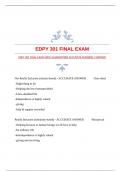
-
EDPY 301 FINAL EXAM WITH GUARANTEED ACCURATE ANSWERS |VERIFIED
- Exam (elaborations) • 21 pages • 2024
-
- $13.49
- + learn more
Not Really Inclusion (charity-based) - ACCURATE ANSWER-One-sided -Right thing to do -Helping the less fortunate/abled -A less disabled life -Independence is highly valued -giving -help & support rewarded Really Inclusion (solidarity-based) - ACCURATE ANSWER-Reciprocal -Helping because as human beings we all love to help -An ordinary life -Interdependence is highly valued -giving and receiving Medical Model of Disability - ACCURATE ANSWERPosits the person as the problem, to ...
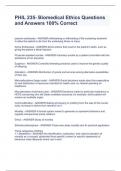
-
PHIL 235- Biomedical Ethics Questions and Answers 100% Correct
- Exam (elaborations) • 22 pages • 2023
-
Available in package deal
-
- $11.49
- + learn more
PHIL 235- Biomedical Ethics Questions and Answers 100% CorrectPHIL 235- Biomedical Ethics Questions and Answers 100% CorrectPHIL 235- Biomedical Ethics Questions and Answers 100% CorrectPHIL 235- Biomedical Ethics Questions and Answers 100% Correctpassive euthanasia - ANSWER-withdrawing or withholding of life-sustaining treatment to allow the patient to die from the underlying illness or injury Active Euthanasia - ANSWER-direct actions that result in the patient's death, such as giving the p...

-
SOCRA - CCRP (high level) Exam Questions & Answers 100% Accurate
- Exam (elaborations) • 44 pages • 2024
- Available in package deal
-
- $12.19
- + learn more
Nuremberg Code (1947) - ANSWER-A research ethics code that arose in response to the Nazis' inhumane experimentation (nuremberg trials) - holocaust, racial hygiene / eugenics / master race. The Nuremberg Code - 10 points - ANSWER-1. voluntary 2. necessary for results 3. logical design and results 4. avoid unnecessary harm 5. cannot result in death or disablement 6. risk assessment 7. protect subjects against harm 8. qualified investigators 9. right to withdrawal 10. right to end tria...
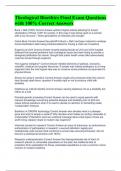
-
Theological Bioethics Final Exam Questions with 100% Correct Answers
- Exam (elaborations) • 7 pages • 2024
-
- $12.99
- + learn more
Buck v. Bell (1927) Correct Answer upheld Virginia statute allowing for forced sterilization of those "unfit" for society; in this case it was being used on a woman with a low IQ score - "three generations of imbeciles are enough" Carrie Buck Correct Answer the plaintiff in Buck v. Bell; had been ordered to undergo forced sterilization after being institutionalized for having a child out of wedlock Eugenics at UVA Correct Answer several leading faculty at UVA and UVA hospital believed ...
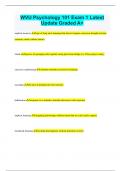
-
WVU Psychology 101 Exam 1 Latest Update Graded A+
- Exam (elaborations) • 10 pages • 2024
- Available in package deal
-
- $9.99
- + learn more
WVU Psychology 101 Exam 1 Latest Update Graded A+ implicit memory type of long term learning that doesn't require conscious thought to learn (memory made without intent) chunk process of grouping info together using prior knowledge (ex. Chess player study) classical conditioning stimulus-stimulus associative learning encoding the pact of putting info into memory habituation response to a stimulus-stimulus decreases with exposure implicit learning acquiring knowledge withou...
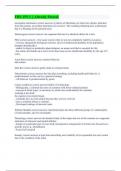
-
FBS 155-1 || Already Passed.
- Exam (elaborations) • 10 pages • 2024
-
Available in package deal
-
- $10.89
- + learn more
incomplete dominance correct answers A pattern of inheritance in which two alleles, inherited from the parents, are neither dominant nor recessive. The resulting offspring have a phenotype that is a blending of the parental traits. Homozygous correct answers An organism that has two identical alleles for a trait PKU correct answers - first cases to prove that we are not completely ruled by our genes. - we have changed the biological outcome. (level of intellectual disability in the popula...

Did you know that on average a seller on Stuvia earns $82 per month selling study resources? Hmm, hint, hint. Discover all about earning on Stuvia


